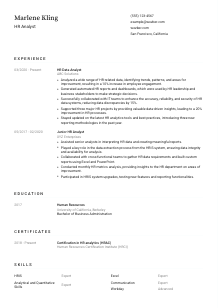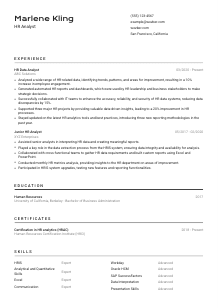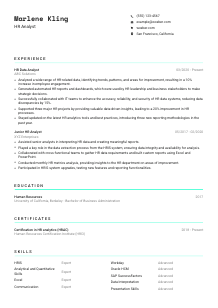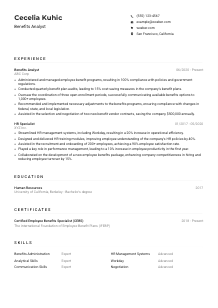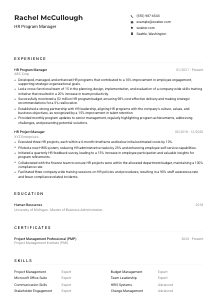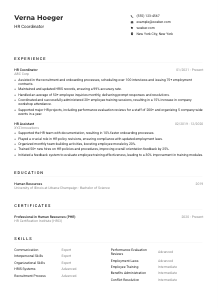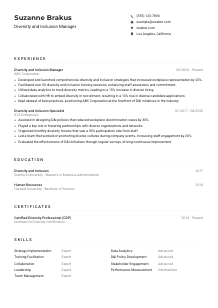HR Analyst Resume Example
Decoding workforce insights, but your resume feels like a cryptogram? Unravel this HR Analyst resume example, crafted using Wozber free resume builder. Discover how to showcase your people analytics prowess in sync with job requirements, so your HR career story reads as fluently as you interpret data!
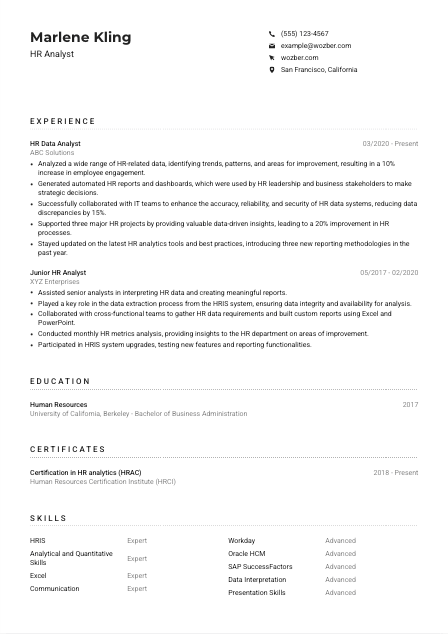
How to write a HR Analyst Resume?
Embarking on your journey toward securing that coveted HR Analyst role? Your resume is not just a list of your experiences and skills – it's a strategic tool designed to market you as the ideal candidate for the job. Tailoring your resume to the HR Analyst position requires insight, precision, and a touch of creativity.
With the right approach and the help of Wozber's free resume builder, including the ATS-friendly resume template and ATS resume scanner for keywords optimization, crafting an ATS-compliant resume that resonates with recruiters becomes a straightforward yet impactful task. Let's dive into the specifics of creating a resume that not only ticks all the boxes but also showcases your unique value as a HR Analyst.
Personal Details
The 'Personal Details' section might seem straightforward, but it's your resume's opening handshake with potential employers. It's crucial to optimize this section to immediately capture attention and align with the HR Analyst role you're aiming for. Here's how you can make your introduction not just polite, but compelling and relevant.
1. Brand Yourself with Your Name
Think of your name as your personal brand identity. It should be prominently displayed, using a clean, professional font. A slightly larger font size helps it stand out, ensuring the hiring manager remembers it.
2. Mirror the Job Title
Position yourself as the ideal candidate right from the start by including the job title you're applying for, such as 'HR Analyst,' directly beneath your name. This technique subtly aligns your professional identity with the role, making it easier for hiring managers to envision you in the position.
3. Ensure Your Contact Information is Precise
Accuracy in your contact details is non-negotiable. Include a phone number and a professional email address formatted as firstname.lastname@email.com. This detail ensures recruiters can quickly reach you without any hassle.
4. Tailor Your Location
"San Francisco, California" isn't just an address - it's a strategic inclusion that matches the job's geographical requirement. It reassures the employer of your availability and potential ease of integration into the team.
5. Leverage Your Professional Online Presence
If applicable, include a link to your LinkedIn profile or a personal website that further showcases your professional background. Ensure that the information is current and mirrors the achievements and skills outlined in your resume.
Takeaway
Your personal details are the foundation of your resume's narrative. Crafted carefully, they not only introduce you but also strategically position you as the perfect fit for the HR Analyst role. Remember, you're not just sharing your contact info; you're initiating a professional dialogue.





Experience
The 'Experience' section is where you spotlight your HR Analytic prowess and past contributions. It's your opportunity to demonstrate how your previous experiences directly prepare you for the responsibilities and challenges of the HR Analyst role you desire. Here are the steps to making your history a compelling argument for your future.
- Analyzed a wide range of HR‑related data, identifying trends, patterns, and areas for improvement, resulting in a 10% increase in employee engagement.
- Generated automated HR reports and dashboards, which were used by HR leadership and business stakeholders to make strategic decisions.
- Successfully collaborated with IT teams to enhance the accuracy, reliability, and security of HR data systems, reducing data discrepancies by 15%.
- Supported three major HR projects by providing valuable data‑driven insights, leading to a 20% improvement in HR processes.
- Stayed updated on the latest HR analytics tools and best practices, introducing three new reporting methodologies in the past year.
- Assisted senior analysts in interpreting HR data and creating meaningful reports.
- Played a key role in the data extraction process from the HRIS system, ensuring data integrity and availability for analysis.
- Collaborated with cross‑functional teams to gather HR data requirements and built custom reports using Excel and PowerPoint.
- Conducted monthly HR metrics analysis, providing insights to the HR department on areas of improvement.
- Participated in HRIS system upgrades, testing new features and reporting functionalities.
1. Dissect the Job Requirements
Break down the job description to understand the core responsibilities and preferred skills. For instance, proficiency in HRIS systems like Workday, Oracle HCM, and SAP SuccessFactors is a pivotal requirement, as is the ability to analyze HR-related data for insights.
2. Present Your Professional Journey
Organize your experiences in reverse chronological order, starting with your most recent position. Clearly list your job title, company name, and the period of your employment, establishing a clear timeline of your career growth.
3. Showcase Relevant Achievements
Detail your accomplishments in each role, particularly those that align with the HR Analyst's responsibilities. For example, "Analyzed HR-related data, identifying trends that led to a 10% increase in employee engagement." This specificity directly correlates your experience with the target role's requirements.
4. Quantify Your Impact
Numbers speak volumes. Whenever possible, quantify your achievements to showcase your impact. Doing so provides tangible evidence of your contributions and capabilities, such as "Reduced data discrepancies by 15% through enhanced data system security measures."
5. Highlight Relevant Projects and Collaborations
Emphasize any projects or collaborations, especially those involving cross-functional teams or IT, that are relevant to the HR Analyst role. Showcasing your ability to work in diverse teams accentuates your versatility and alignment with job requirements.
Takeaway
Your 'Experience' section is the backbone of your resume, vividly portraying your journey and worth to potential employers. Tailor each point to mirror the job requirements, providing a narrative that bridges your past achievements with future aspirations. Let your career story resonate with the role of a HR Analyst, making it impossible for hiring managers to overlook your candidacy.
Education
Your education lays the groundwork of your expertise, particularly in fields as specialized as HR Analytics. While it might seem straightforward, presenting your educational background in a way that supplements your professional narrative can significantly bolster your appeal for the HR Analyst role.
1. Identify the Essential Educational Background
The job calls for a "Bachelor's degree in Human Resources, Business Administration, or a related field." Ensure your education section directly aligns with this requirement if applicable, clearly stating your degree to match the job's specifics.
2. Structure with Clarity
Maintain a clean and straightforward layout for the education section: Degree, Field, Institution, and Graduation Year. This crisp structure makes it easy for hiring managers to verify your educational qualifications against their requirements.
3. Match Your Degree to the Job Description
When your field of study directly aligns with the role, like a "Bachelor of Business Administration in Human Resources," make it prominent. This direct link serves as a strong indicator of your foundational knowledge and relevance for the position.
4. Showcase Relevant Additional Academics
If your coursework, thesis, or any academic projects particularly relate to the HR Analytics field, mention these as well. This additional detail can further assert your passion and preparation for the role, especially for early-career professionals.
5. Highlight Academic Achievements and Extracurriculars
While more senior roles may focus less on academic extras, early-career candidates can benefit from including honors, clubs, or societies that underscore leadership, teamwork, or relevant interests. Be selective and ensure these details reinforce your candidacy for the HR Analyst role.
Takeaway
Your education section is more than a list of degrees – it's a narrative of your academic commitment and relevance to the HR Analyst role. Align it with the job requirements, and let it serve as proof of your solid foundation in the field. Every detail you choose to include should strategically contribute to your story as the ideal candidate.
Certificates
In the evolving field of HR Analytics, certifications can significantly enhance your credibility by demonstrating your commitment to continuous learning and mastery of specific skills. Tailoring this section to include relevant certifications can set you apart as a well-qualified candidate for the HR Analyst position.
1. Assess Certificate Relevance
Start by determining which, if any, certificates are directly mentioned in the job posting. For example, the "Certification in HR analytics (HRAC)" is highly valued for this position, showcasing a specialized understanding and expertise in HR data analysis.
2. Prioritize Pertinent Certifications
Include certificates that demonstrate relevant skills or knowledge for the HR Analyst role. Prioritize those that align closely with the job requirements, such as HRAC, to highlight your dedication to the field and your proactive approach to professional development.
3. Clarify Certification Dates
Where applicable, include the date of certification. This information can provide insight into the currency of your knowledge and skills, an important factor in fast-evolving fields like HR Analytics.
4. Commit to Continuous Learning
Highlight your dedication to staying current in your field by mentioning any ongoing education or plans to pursue further certifications. This showcased commitment to professional growth can be a significant asset in your candidacy.
Takeaway
Your certifications are a testament to your dedication and expertise in the HR Analytics domain. Selectively include those that bolster your qualifications for the HR Analyst role, using them to portray a narrative of continuous learning and professional excellence. This section can significantly contribute to establishing you as a standout candidate in the competitive HR field.
Skills
The 'Skills' section of your resume is a powerful way to quickly communicate your ability to fulfill the HR Analyst role. This concise list should reflect both the hard skills necessary for the position's technical demands and the soft skills that demonstrate your capability to thrive in a collaborative and dynamic environment.
1. Extract Skills from the Job Description
Analyzing the job description closely will reveal both stated and implied skill requirements. For example, "Proficiency in HRIS systems, particularly with data extraction and report generation" clearly indicates a need for technical proficiency in specific software, as well as analytical and reporting skills.
2. Match and Prioritize Your Relevant Skills
Once you've identified the essential skills, align them with your own skillset. Prioritize those that are most relevant to the HR Analyst position, such as HRIS expertise or analytical prowess, to highlight your suitability for the role.
3. Organize for Impact
Arrange your skills in a way that draws the hiring manager's attention to your most relevant expertise first. A mix of hard and soft skills illustrates your well-roundedness as a candidate, so consider categorizing them or listing them in order of relevance to the HR Analyst role.
Takeaway
Your 'Skills' section is a snapshot of your professional arsenal, tailored to the HR Analyst role's specific demands. By strategically selecting and organizing your skills, you can quickly assure hiring managers of your capability and fit for the position. Invest thought and precision here to make a compelling case for why you're the ideal candidate.
Languages
In our increasingly global business environment, language skills can be a significant asset, enhancing your ability to communicate with diverse teams and stakeholders. For a HR Analyst, who may deal with international data or collaborate across borders, linguistic fluency can add considerable value to your profile.
1. Assess the Job's Language Requirements
First, determine if the job posting explicitly lists language skills as a requirement. For the HR Analyst role, "English language skills essential" highlights the need for fluency in English, positioning it as a non-negotiable competency.
2. Prioritize Essential Language Skills
If the job requires specific language skills, list them prominently. Your fluency level in these languages, particularly English, should be clearly stated, as it directly impacts your ability to perform in the role.
3. Include Additional Languages
Though the job might emphasize certain language proficiencies, don't hesitate to list additional languages you're fluent in. This can showcase your multi-cultural literacy and potential to contribute to diverse teams, enhancing your appeal as a HR Analyst candidate.
4. Be Honest About Your Proficiency Levels
Clarity about your language proficiency is key. Use terms like 'Native,' 'Fluent,' 'Intermediate,' or 'Basic' to describe your skill level, providing an honest assessment of your capability to communicate in each listed language.
5. Evaluate the Role's Scope
Consider the broader context of the HR Analyst role. If it involves international data analysis or collaboration with global teams, highlighting multiple language skills can underscore your ability to navigate these complexities effectively.
Takeaway
Your linguistic skills are more than just a part of your personal background; they're a professional asset that can set you apart in the HR Analytics field. By strategically listing your language proficiencies, you underscore your readiness to engage with a global workforce, marking you as a versatile and valuable candidate for the HR Analyst role.
Summary
Your resume summary is your chance to make a strong first impression, concisely conveying your qualifications and enthusiasm for the HR Analyst position. A well-crafted summary sets the tone for the rest of your resume, highlighting your suitability and sparking interest in your profile.
1. Capture the Essence of the Role
Start by distilling the essence of the HR Analyst position from the job description. This will help you tailor your summary to echo the role's key requirements and responsibilities.
2. Lead with a Strong Introduction
Kick off your summary with a statement that encapsulates your professional identity and core competencies. For an HR Analyst, this might look like: 'Detail-oriented HR Analyst with a passion for transforming data into actionable insights.'
3. Address the Must-Haves
Highlight critical skills and experiences that directly respond to the job description. Mention your proficiency in HRIS systems and your track record of leveraging data for strategic decision-making, directly aligning with the role's demands.
4. Keep It Concise
Your summary should be a teaser, not a tell-all. Aim for 3-5 sentences that succinctly present your qualifications and enthusiasm for the HR Analyst role, inviting hiring managers to delve deeper into your resume.
Takeaway
Consider your summary as your resume's elevator pitch – a compelling snapshot of your professional narrative crafted to resonate with the HR Analyst role. Use this section to assert your candidacy confidently, showcasing your unique value and readiness to contribute as a HR Analyst. Let it serve as the compelling hook that encourages further exploration of your qualifications.
Launching Your HR Analyst Journey
Congratulations on taking this detailed dive into crafting a tailored resume for the HR Analyst position! With the insights and tips outlined here, and by utilizing Wozber's free resume builder, including our ATS-friendly resume templates and ATS resume scanner for keywords optimization, you're equipped to create an ATS-compliant resume that not only meets but exceeds the expectations of recruiters. Your resume is the first step in your journey to securing your dream role as a HR Analyst. Refine it, make it uniquely yours, and let it open the doors to your next big opportunity.
The future is bright, and your path as a HR Analyst is waiting. Ready, set, go forth and showcase your brilliance!

- Bachelor's degree in Human Resources, Business Administration, or a related field.
- Minimum of 3 years of experience in HR analytics or a related HR data-driven role.
- Proficiency in HRIS systems, particularly with data extraction and report generation (e.g., Workday, Oracle HCM, SAP SuccessFactors).
- Strong analytical and quantitative skills, with the ability to interpret complex data sets and present findings in a clear and concise manner.
- Certification in HR analytics (HRAC) preferred.
- English language skills essential.
- Must be located in or willing to relocate to San Francisco, California.
- Analyze HR-related data to identify trends, patterns, and potential areas of concern or improvement.
- Generate recurring HR reports and dashboards for HR leadership and business stakeholders.
- Collaborate with IT teams to ensure the accuracy, reliability, and security of HR data systems.
- Support HR projects and initiatives by providing data-driven insights and recommendations.
- Stay updated on HR analytics best practices and tools to continuously enhance reporting capabilities.





